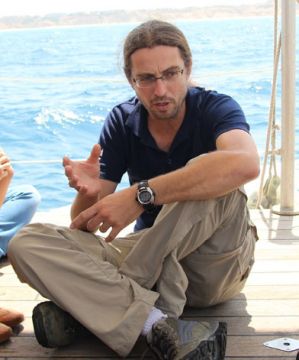
Prof. Daniel Sher
Department: Marine Biology
Research Areas: Chemical Ecology and Microbial Oceanography
Laboratory: The Marine Chemical Ecology Lab, Room 291, Multipurpose Building
Phone: +972-4-8249349
Office: 270/2, Multipurpose Building
Email: dsher@univ.haifa.ac.il
Daniel Sher is a Professor of Marine Biology at the Leon H. Charney School of Marine Sciences, University of Haifa (Israel). Daniel completed his undergraduate and PhD studies at the Hebrew University of Jerusalem, followed by postdoctoral studies at MIT. His main research interest lies in Aquatic Chemical Ecology and Microbial Oceanography – understanding the way aquatic organisms communicate through chemistry, the chemicals that mediate these interactions, and the way these interactions and chemicals affect entire ecosystems. Most of the people in his lab currently study how Prochlorococcus, a tiny marine cyanobacterium and the most abundant photosynthetic organism on Earth, interacts with co-occurring marine bacteria. Other projects in the lab focus on understanding the causes for jellyfish blooms (including whether their associated bacteria are involved in bloom growth and decline), and on developing methods to use natural marine bacterial communities as biosensors for pollution. Daniel is also a member of the steering committee of the University of Haifa Data Science Research Center, and of the outreach committee of the School of Marine Sciences. He is married, has three kids and a dog, and in his spare time loves hiking, cooking and photography.
Our lab studies marine chemical ecology – the way aquatic organisms communicate through chemistry, the chemicals that mediate these interactions, and the way these interactions and chemicals affect entire ecosystems. This is a fascinating field of research that combines ecology, limnology/oceanography, biochemistry, molecular and cellular biology, physics and computational biology. In addition, studying these interactions often brings with it the discovery of novel chemical compounds which have biotechnological, pharmacological or medical uses – antibiotics, for example, are often synthesized by microorganisms in order to fight other microbes. Some of the questions we are interested in are: Do marine bacteria communicate using chemical signals? What are the roles of toxins in jellyfish, sea anemones, coral and hydra? How do marine invertebrates protect themselves against pathogens? Can understanding such interactions help us model marine communities and predict how they will change in a changing world?
2010- Lecturer, Department of Marine Biology, Charney School of Marine Sciences, Haifa University, Israel
2007-2010 Post-doctoral Fellow, Department of Civil and Environmental Engineering, Massachusetts Institute of Technology, USA.
2000- 2008 PhD Summa cum Laude, Hebrew University, Jerusalem, Israel. Mentor: Prof. Eliahu Zlotkin,
Thesis Title: Biological Role of a Non-Nematocystic Toxin in Cnidaria – An Exercise in Chemical Ecology.
1997 – 2000 B.Sc. magna cum laude in Biology, the Hebrew University of




